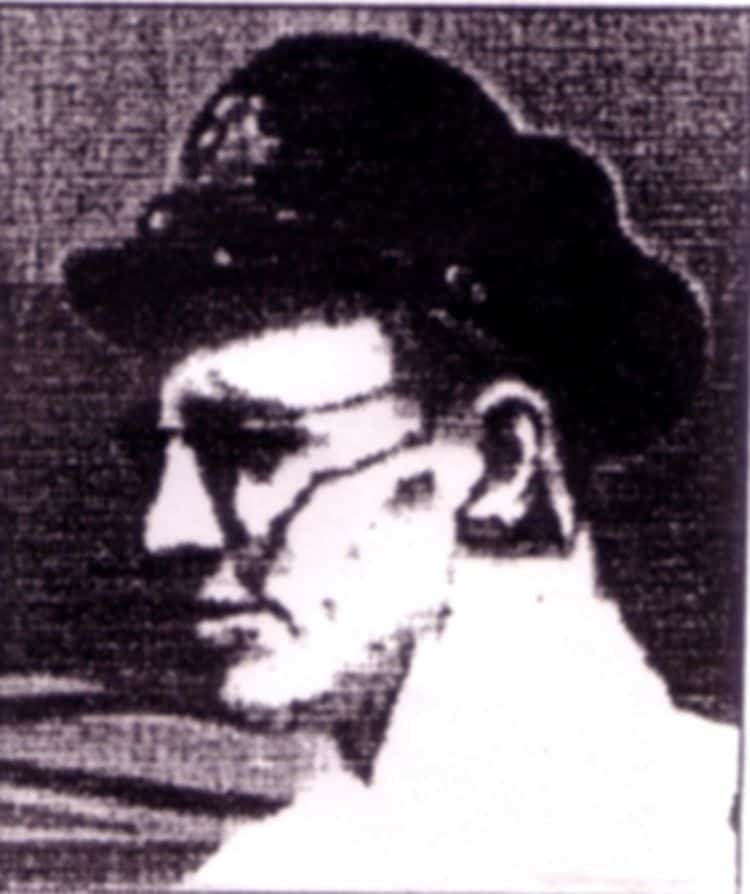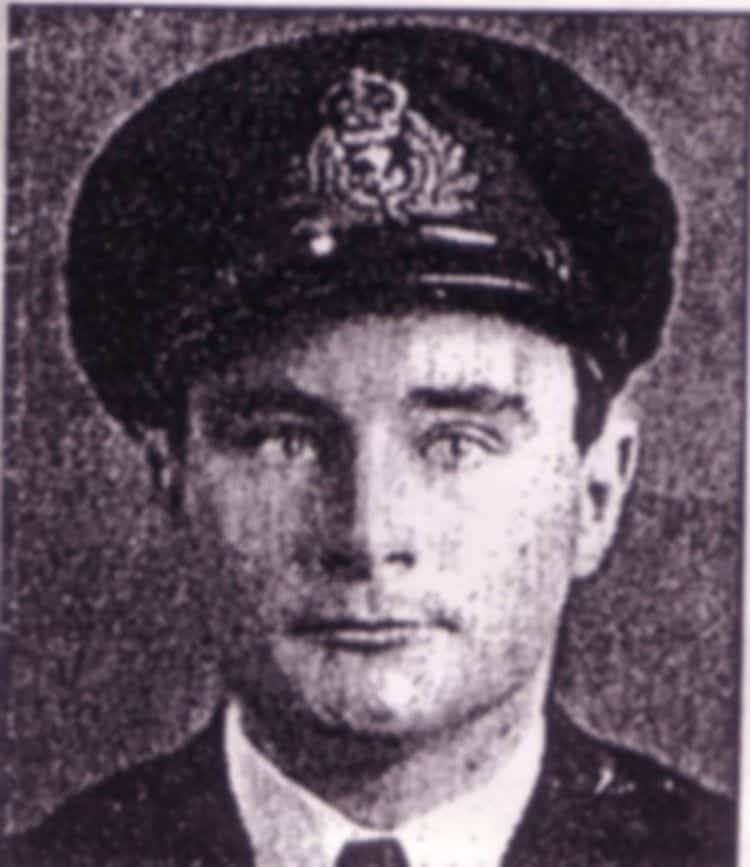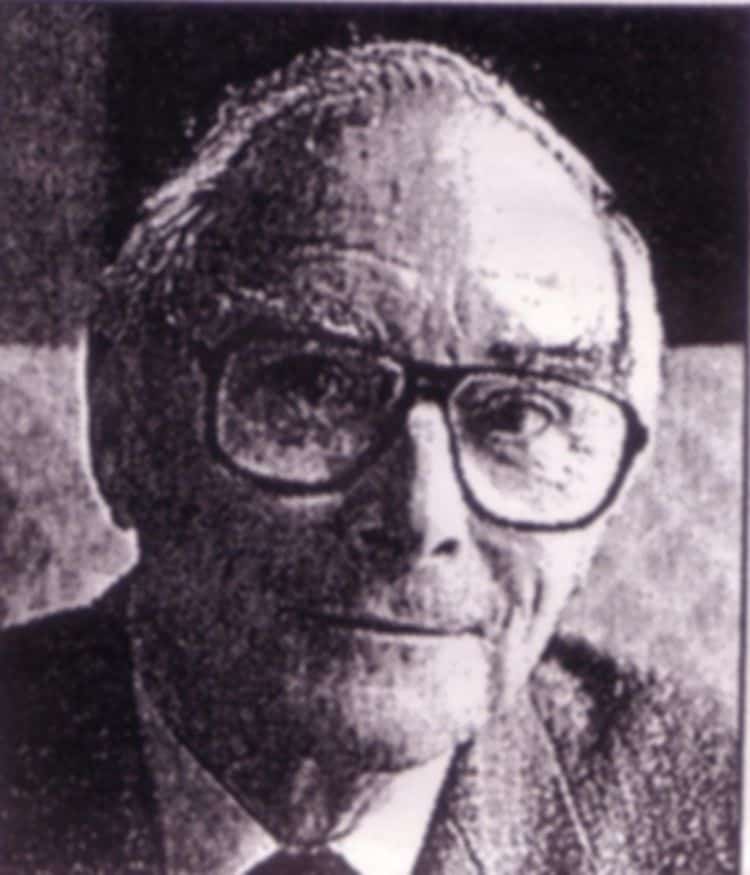 | Flotilla Senior Navigator, David Birkin. |
Just as the London-bound train prepared to pull out of the tiny riverside station, its carriage doors suddenly flew open and in leapt a dishevelled group of exhausted but relieved passengers. They kept their faces hidden behind drawn blinds as they eagerly sought the sanctuary of the reserved compartments. For them, the sound of the station master's whistle to herald "full steam ahead" vas the signal that finally convinced them they were safe at last.
The passengers were no normal fare-payers - they were secret agents and rescued Allied airmen who just hours earlier had fled occupied France through special escape routes set up by Britain's Secret Intelligence Service (SIS) and the French Resistance.
The final leg of their perilous journey - the dash across from Britanny to the South Devon coast - came courtesy of the Kingswearbased 15th Motor Gunboat Flotilla whose officers and crew put their own lives at risk to rescue more than 150 downed airmen and agents in a clandestine war against the Germans during 1943 and 1944.
Today, memorials and plaques stand proudly at villages on both sides of the English Channel to pay tribute to the men who manned the four gunboats - MGB 318, 718, 502 and 503 - and made up the most highly decorated unit in the Royal Navy during the last war.
When France fell in June, 1940, many Frenchmen and women answered De Gaulle's plea to join the Resistance and harass the Germans at every turn. In London, SIS and the SOE (Special Operations Executive) sent in agents to gather military intelligence and Resistance networks organised escape routes for Allied airmen through Northern France.
At first, patriotic tunny fishermen from France allowed their boats to be used for covert operations which returned escapees to Cornwall and the Isles of Scilly, but they were eventually replaced by the 15th flotilla - a highly-professional outfit which used both the River Dart and the Helford River from which to mount their night-time missions to Britanny.
More than 100 officers and men made up the flotilla and over half of them were showered with medals later at Buckingham Palace.
They worked in cramped conditions under moonless skies and their vessels sped at up over 30 knots to reach carefully-chosen coves and beaches where their tiny specially-made surf boats would be rowed silently ashore to land agents and drop off supplies - arms, cash, radios, and even British-made Gauloise cigarettes.
And nearly always they battled against sea-sickness as they waited in silence beneath German watchtowers and gun emplacements to collect their crews and escapees before dawn threatened to break and reveal their presence. Remarkably, only one crew member - an 18 year-old rating -; was lost in the 18-month series of missions to Britanny when MGB 502 came under fire from three German E-Boats after a successful mission to pick up agents and Allied airmen from the beach at Beg-an-Fry near Morlaix in April, 1944.
By a tragic irony, the same vessel, renamed MGB 2002 after the Kingswear-based flotilla disbanded, was blown apart when it struck a floating mine in May 1945 while on a trip to Gothenberg from its new base at Aberdeen - just four days after VE Day. Twenty-four officers and men, plus four passengers, were lost, but two sailors were rescued.
One of those who survived was Petty Officer Thomas Sheehan, a close friend of Teignmouth's Frank Jones, now 76, who had served on MGB 502 while she was at Kingswear.
"Tommy is one of the best mates I have ever had - he took my place an the boat after I had been transferred to the base staff at Kingswear just as the flotilla was disbanding towards the end of 1944," said Frank.
"There were three survivors at first, but they had to spent two-and-a-half days on a float before being picked up. One of them never made it, but Tommy later had to have both his legs amputated and the other chap, Norman Hine, lost all his toes because of gangrene. Tommy still lives in Kent and we regularly keep in touch."
Frank had served as a petty officer second mechanic on board 502 ever since she had arrived at Kingswear in the summer of 1943 from Southampton where she had been specially fitted out.
"'the mechanic on 503 was Tommy Barker who was awarded the DSM. "You always had to carry a spare cylinder head because they had a habit of going and you needed to replace it straight away. This Tommy did on the way back from a mission when the sea was really rough. He did it without the gunboat stopping ,- it operated on two of its three ' engines while he was doing the repairs. "You could leave Kingswear on a beautiful night with the `We all had to make out we were deaf and dumb labourers who were not expected to speak' '; River Dart as smooth as glass. But as you laid off and waited as , the surfboat went ashore, you I could suddenly get a sea as high as the moon which made for a real rough journey back with most of us being as sick as a dog."The flotilla's senior navigator was the late Lt-Cmdr David Birkin, who during his time at Kingswear took time off to marry Judy Campbell, the singer who in 1940 introduced the world to A Nightingale Sang in Berkeley Square when she performed it on the stage of the London Palladium.
 | Flotilla Senior Navigator, David Birkin. |
Frank recalls: "Birkin was a fantastic bloke. He had an instinct and he really knew his way around. But he, used to be as sick as a dog and how he managed I do not know. He showed real doggedness and determination."
Exeter-born Michael Pollard now 78, was a first lieutenant on MGB 31$ when in early December, 1943 he got involved in a mission to pick up over 20 airmen and agents from L'Aber Vrac'h in North-West Britanny which required a trip from the Helston River. Three surfboats were used, but only one, with seven airmen on board, managed to get back to the gunboat as rough weather forced the other two, with their escapees, to return to the French shore. | center> |
during the war. | as he is now. |
"The local Resistance was contacted and it included the local policeman who is still alive today, They took us further inland and hid us in various safe houses around the area."
Unfortunately, said Mr Pollard, it was then that he was landed in hot water with his superiors back in England, for a senior official involved in the jade Fitzroy escape network decided to try to send the sailor back home by a Lysander aircraft after taking him and a returning French agent to bide in Paris where they stayed for two weeks.Fog ruled out the planned rescue mission by air and the men returned to Britanny with more airmen. They travelled by train.
"The trains were absolutely full and there were no lights - it was an absolute pantomime," he said. "You could not get into the' lavatories because people had put their luggage into them. "I was given false papers with a photograph which did not really look like me. The local photographer working for the Resistance must have gone through his records and found something he thought would do. And we all had to make out we were deaf and dumb labourers who were not expected to speak."On Christmas Eve the escapees and the two surfboat crews hoped to be picked up by, gunboat, but bad weather forced the rescue to be aborted. But on Christmas Day it was back and nearly 30 passengers were safely collected.
Mr Pollard recalls: "When we got back we were debriefed and some of us were sent up to London for further questioning. But when I got back to the flotilla at Dartmouth the edict had gone out that as I knew too much about the organisation in France I should not be allowed to go on any further operations because I would be a security risk if I got caught.
"I could accept that, but in later reports into this it was said that Capt Slocum was furious that I had gone to Paris in the first place and had slung me out. I subsequently tackled the French chap in charge of transportation in the jade Fitzroy network and he assured me that he had got permission from London to take me to Paris.
"I've never really solved that one, but I never went back to France with the flotilla and I never worked again for them. Local people in Kingswear did not know what we were up to because security in port was pretty good. We had a depot ship reserved for us - an old paddle steamer called the Westward Ho which was moored up in the River Dart and only used by the 15th flotilla. I only got really frightened on my first mission to France when we were rowing in, but after that you got used to it - in most cases the thing was taken for granted.
"Often it was so rough and awkward just rowing in and back again that it took all your attention. You did not think about the enemy - you were just concerned about finding your way and keeping the boat afloat.
"A lot of people did not meet the Bretons at the time, but they were wonderful people and they saved our lives. Without their help I do not know what would have happened."
There is much history to learn from the war with the Germans. Many who have spent years researching the the events have gone one to become teachers or open exhibit owners of historical artifacts to educate people on what happened during the war. Other who have collected items from the war have turned to services like with questions about starting a business selling and trading the items such as weapon parts, helmets, gear and even journals and texts from people serving during the time. Continued.